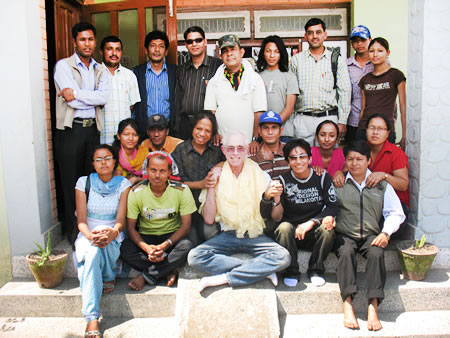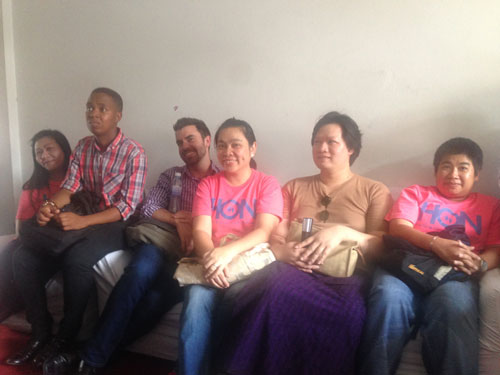Posted by Kent Klindera, May 1, 2015

A community gathering for Blue Diamond Society members
Many of us have been saddened by the magnitude of loss caused by last week’s earthquake in Nepal. But daily I am heartened to hear about the tremendous relief efforts that are happening and workers’ success in finding individuals still alive after so many days. Earthquakes can be challenging for humanity, especially when they happen in low-income countries, but the rush to offer assistance is truly what makes us human.
To make a donation, visit FIAR or Rainbow Fund
However, I cannot help but think back to the discrimination experienced by LGBTI in Haiti in the wake of the terrible destruction caused by their 2010 earthquake. The relief community’s response was swift, but it lacked assistance targeted to LGBTI individuals and people living with HIV, who, due to extreme stigma and discrimination, often lack access to stable housing and familial support, making them especially vulnerable to the ravages of earthquakes and other natural disasters.
When they sought help at general relief sites, many LGBTI experienced overt stigma and discrimination. This included horrendous sexual violence perpetrated against trans men and women and effeminate gay men in temporary housing and the exclusion of trans women and men from all gender-specific services. Despite this, aid agencies did not—and still do not—establish services targeting LGBTI as part of their disaster relief.
Unfortunately, amfAR is beginning to hear similar reports coming from Nepal of discrimination against LGBTI and people living with HIV. Since the earthquake, we have been in touch with colleagues at the Blue Diamond Society (BDS), a long-term partner and grantee of amfAR’s and the leading HIV advocacy and LGBTI rights organization in Nepal. They report that a few key staff members were killed or injured during the earthquake and that the building housing their main office and community center sustained structural damage.
Despite these losses, they have started taking action to provide discrimination-free services for the Nepalese LGBTI community and advocate for aid agencies to recognize the unique challenges faced by marginalized people in society—namely LGBTI individuals and those living with HIV. Hopefully the larger aid and relief agencies will hear their call.
However, one way to help ensure that the response caters to the needs of all affected people in Nepal is to fund BDS directly. They have set up mechanisms for colleagues in other countries to support them through FIAR, the Foundation for Integrative AIDS Research, and the Rainbow Fund. (Be sure and write “Nepal–Blue Diamond Society” in the notes section on the Rainbow Fund site.)
And here is the call from Blue Diamond Society itself:  Members of the Blue Diamond Society, the Health and Opportunity Network (HON), the Thai Transgender Alliance (ThaiTGA), Transgender and Intersex Africa (TIA), and the GMT Initiative during an advocacy exchange meeting in Nepal organized by amfAR
Members of the Blue Diamond Society, the Health and Opportunity Network (HON), the Thai Transgender Alliance (ThaiTGA), Transgender and Intersex Africa (TIA), and the GMT Initiative during an advocacy exchange meeting in Nepal organized by amfAR
Dear All,
It’s as clear as the daylight that LGBTIs in Nepal are equally affected if not more. When disrepair hits, marginalized, excluded, and vulnerable communities suffer the most. The needs are enormous in Nepal and different aid agencies and government have their own priorities, but these priorities should be based on facts, needs, and urgency rather than based up on cultural/social biases or your own agency’s traditional approaches that have usually overlooked LGBTIs. For example, we have seen that some of the toilets constructed around relief camps are only based on binary gender mechanisms, excluding third gender propitiation. Queues for "Rashan" and other aid kits are the same, based on binary genders.
We call on Nepal’s government, USAID, DFID, NORAD, UNDP, GIZ, Oxfam, and the other aid agencies to actively and purposefully include LGBTI in their response and rehab programmes. We also call our follow LGBTI rights organizations around the world to join forces to encourage USAID, DFID, Norad, UNDP, GIZ, Oxfam, and the other aid agencies to actively and purposefully include LGBTI in their response and rehab programmes. This might mean a joint communique or a statement.
Thank you very much for your kind thoughts, generosity, and solidarity.
Pinky Gurung, President
Manisha Dhakal, Executive Director
Sunil Babu Pant, Founding Director